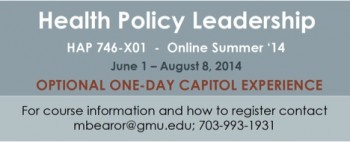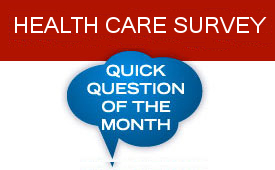Posted by CHPRE Staff
Presentations
Sunday, March 29th, 2009
This presentation took place on March 29, 2009 at the American College of Cardiology Scientific Conference in Orland, FL.
“Health System Reform: Why, What, and What the ACC Can Do,” Bishop Lecture, American College of Cardiology Scientific Conference, Orlando, FL March 29, 2009.
Posted by CHPRE Staff
Testimony
Tuesday, March 24th, 2009
Highlight:
Insurance markets are a great place to focus on early in your inquiries. We know that having quality health coverage is literally a matter of life and death. The Institute of Medicine (IOM) estimates that over 18,000 Americans die every year because they do not have access to the timely and necessary care that health insurance affords.[i] Many of us in this room take this kind of seemingly routine care for granted, yet I know that securing access to health insurance for all is a moral obligation that many members of this committee share.
“Addressing Insurance Market Reform in National Health Reform,” – U.S. Senate Committee on Health, Education, Labor, and Pensions – March 24, 2009
Click here to view the testimony.
[i] Institute of Medicine, Coverage Matters: Insurance and Health Care, (National Academies Press: Washington, D.C., 2001).
Posted by CHPRE Staff
Presentations
Monday, March 16th, 2009
This presentation took place on March 16, 2009 at the New Hampshire Endowment for Health in Concord, NH.
“Health System Reform: National, State, and Private Options,” New Hampshire Endowment for Health, Concord, NH March 16, 2009.
Posted by CHPRE Staff
Presentations
Friday, March 6th, 2009
This presentation took place on March 6, 2009 at the Association of American Medical Colleges Council of Learned Societies’ : Knapp Lecture, in Charleston, SC.
“Economic, Political, and Systemic Forces for and Against Health Reform,” Association of American Medical Colleges Council of Learned Societies’ Knapp Lecture, Charleston, SC March 6, 2009.
Posted by CHPRE Staff
Publications
Wednesday, March 4th, 2009
Executive Summary:
Many comprehensive reform proposals reflect the fundamental need to control health care costs and create a marketplace wherein insurers compete on value and customer satisfaction, rather than risk selection and marketing. Several leading proposals promote competition between private health plans and a “public” health insurance option. Unfortunately, the debate over this issue has become polarized unnecessarily. It is possible to structure a new insurance marketplace so that public and private health plans compete on a level playing field. This will require separating the oversight of the public plan from that of the managers of the marketplace or exchange(s). It will also require that all rules of the marketplace – benefit package requirements, insurance regulations, and risk adjustment processes – apply to all plans equally, whether public or private. Finally, this model requires that we address cost growth containment systemically and avoid relying heavily on the public plan’s potential market power. In turn, this will require a commitment on the part of policymakers to acquire a health information infrastructure, develop best practice information, and encourage re-aligned incentives that promote high-quality, efficient care for all.
“A Modest Proposal for a Competing Public Health Plan,” (with John Bertko). New America Foundation (March 2009)
Click here to view the article.
Posted by CHPRE Staff
Publications
Tuesday, March 3rd, 2009
About the Collection:
The ever-growing cost of health care is the largest threat to our nation’s long-term fiscal future. One way of tackling this problem is by using Medicare-the nation’s largest purchaser of health care-as a catalyst for widespread efficiencies in the private sector. Medicare must become a more value-based purchaser to make the Program sustainable over time and incent the private sector toward change. It is imperative that we act decisively and soon. Yet, we believe embarking on a Medicare-only reform effort would be far less productive than comprehensive delivery system reform. Medicare buys health care from the broader delivery system. Therefore, if we fail to address our system as a whole, we will have failed to solve the Medicare Program’s underlying problems. Delivery system reform must benefit all payers, patients, and providers who are willing to excel, but Medicare can and should lead the way.
Edited with Robert A. Berenson, MD. New America Foundation, March 2009. Co-authored essay within that volume with Robert A. Berenson and Thomas Emswiler, “Reforming Medicare’s Governance to Enhance Value-Based Purchasing.”
Click here to view the article.
Posted by CHPRE Staff
Publications
Monday, March 2nd, 2009
Overview :
Hill Physicians Medical Group is the nation’s largest independent practice association, with more than 2,200 physicians, 800 in primary care. Established in 1984 in Northern California, Hill serves 332,000 patients enrolled in seven HMOs, two Medicare Advantage plans, and Medi-Cal, California’s Medicaid Program. Hill member physicians have practices at 1,600 offices, and work in 30 hospitals and 15 urgent care centers. Hill demonstrates how an affiliated group of independent physicians can improve clinical outcomes, increase efficiency, and engender physician support for quality improvement and cost reduction activities. Working with health educators, member physicians have improved patient care: the number of diabetics in control of their blood sugar levels increased by 42 percent and patients in control of their cholesterol levels increased by 32 percent. Through the group, physicians are informed about and encouraged to participate in quality improvement initiatives and receive health information technology training and products.
“Hill Physicians Medical Group: Independent Physicians Working to Improve Quality and Reduce Costs,” (with Tom Emswiler) Commonwealth Fund (March 2009)
Click here to view the article.



